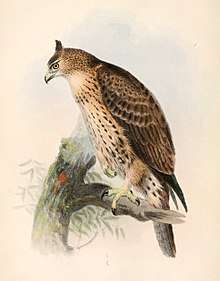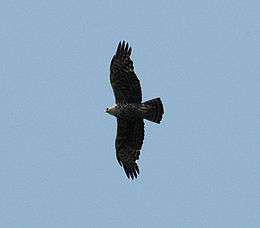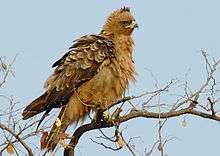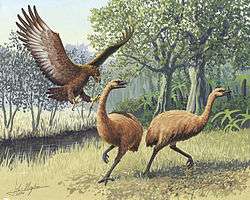Hieraaetus
The genus Hieraaetus, sometimes known as hawk-eagles, denotes a group of smallish eagles usually placed in the accipitrid subfamilies Buteoninae[1] or Aquilinae.[2]
| Hieraaetus | |
|---|---|
 | |
| H. ayresii | |
| Scientific classification | |
| Kingdom: | Animalia |
| Phylum: | Chordata |
| Class: | Aves |
| Order: | Accipitriformes |
| Family: | Accipitridae |
| Subfamily: | Aquilinae |
| Genus: | Hieraaetus Kaup, 1844 |
| Species | |
|
See text | |
They are medium-sized birds of prey inhabiting Europe, Asia, Africa, New Guinea and Australia. A recently-extinct species, the New Zealand Haast's eagle, was the largest eagle ever known, weighing up to 17 kg (37 lb), with a 3 m (9.8 ft) wingspan.[3]
Species
Extant species
| Image | Scientific name | Common Name | Distribution |
|---|---|---|---|
 | Hieraaetus ayresii | Ayres's hawk-eagle | Africa |
.jpg) | Hieraaetus pennatus | Booted eagle | Eurasia and Africa |
_in_flight.jpg) | Hieraaetus morphnoides | Little eagle | Australia |
| Hieraaetus weiskei | Pygmy eagle | New Guinea | |
 | Hieraaetus wahlbergi (formerly Aquila wahlbergi) | Wahlberg's eagle | Africa |
Extinct species
| Image | Scientific name | Common Name | Distribution |
|---|---|---|---|
 | †Hieraaetus moorei | Haast's eagle | New Zealand, extinct |
Former species
- African hawk-eagle (Aquila spilogaster, previously a subspecies H. f. spilogaster or A. f. spilogaster)
- Bonelli's eagle (Aquila fasciata, formerly H. fasciatus)
- Rufous-bellied eagle (Lophotriorchis kienerii, formerly H. kienerii)
Some authorities retain Bonelli's eagle and the African hawk-eagle in Hieraaetus. Also, some retain Wahlberg's eagle in Aquila, whilst still recognizing Hieraaetus as a separate genus.
Taxonomy and systematics
Molecular genetic research has found Hieraaetus to be polyphyletic with Aquila.[note 1][note 2][note 3]
Hieraaetus kienerii was found to be most distinct,[2][6] and has been assigned to a separate genus, Lophotriorchis.[7][8]
After DNA sequences from remains of the extinct giant Haast's eagle were found to be similar to those of the little eagle,[9] it has been reclassified from Harpagornis moorei to the genus Hieraeetus.[3]
The British Ornithological Union moved Bonelli's and booted eagles to Aquila in 2005, but was silent on the position of the non-European Ayres', little, and pygmy eagles.[10]
This could create a taxonomic problem: the booted eagle is the type species of Hieraaetus, moving it would make that name a junior synonym of Aquila. Consequently, should any other hawk-eagles be retained as a distinct group, they would need to get a different genus name. As of 2014, the BOU lists the booted eagle on their Category D and E lists as H. pennatus, not A. pennata.[11]
Christidis and Boles (2008) used an alternative approach. Accepting that both Aquila and Hieraaetus are polyphyletic, they moved spilogaster and fasciatus to the genus Aquila and retained the other former Hieraaetus group along with morphnoides and Aquila wahlbergi within the new delimitation of Hieraaetus.[12]
Sometimes the entire genus is merged into Aquila. This was the approach taken with The Clements Checklist between 2001 and 2009: starting in the 2001 revisions to the 5th edition,[13] and retained in the printed 6th edition of 2007.[14]
The Clements Checklist, in its 2009 revisions, followed the same approach as Christidis & Boles, moving Aquila wahlbergi into Hieraaetus; restoring the booted, little and Ayres' eagles back to Hieraaetus.[7]
The pygmy eagle, or New Guinea hawk-eagle, H. morphnoides weiskei was formerly considered a subspecies of the little eagle H. morphnoides; it has been recognized as a separate species by some authorities.[15]
Whether the fossil "Hieraaetus" edwardsi (Middle -? Late Miocene of SW Europe) belongs to the hawk-eagles proper (if there is such a thing) or into Aquila has not been determined.
Notes
- Lerner & Mindell (2005)[2] found three clades containing a mixture of Aquila and Hieraaetus:
- A. chrysaetos, Spizaetus africanus, H. fasciatus, A. verrauxii, A. audax, A. gurneyi
- A. nipalensis, A. rapax, A. heliaca.
- A. wahlbergi, H. ayersii, H. morphnoides (H. m. morphnoides), H. weiskei (H. m. weiskei), H. pennatus.
- Helbig et al. (2004)[4] concluded that "Hieraaetus fasciatus/spilogaster are closest to Aquila verreauxii and should be merged with that genus. Wahlberg’s eagle H. wahlbergi, formerly placed in Aquila, is part of a clade including three small Hieraaetus species (pennatus, ayresii, and morphnoides)."
- Wink & Sauer-Gürth (2004),[5] comparing sequences of the mitochondrial cytochrome b gene, also found several clades within the booted eagles that did not correspond to the existing genera:
- A. adalberti, A. heliaca, A. rapax, A. nipalensis
- A. audax, H. spilogaster, H. fasciatus, A. verrauxii, A. chrysaetos, A. ch. daphanea
- A. wahlbergi, H. pennatus, H. morphnoides
- A. clanga, A. pomarina, Lophoaetus occipitalis
References
- Peters, James Lee (1931). Check-list of birds of the world: volume 1. Cambridge, Mass., U.S.A.: Harvard University Press. Digitized copy
- Lerner, H. R. L.; Mindell, D. P. (2005). "Phylogeny of eagles, Old World vultures, and other Accipitridae based on nuclear and mitochondrial DNA" (PDF). Molecular Phylogenetics and Evolution. 37 (2): 327–346. doi:10.1016/j.ympev.2005.04.010. PMID 15925523. proof
- Evans, Kate (November 2018). "Return of the Lost Birds". New Zealand Geographic (154): 30. ISSN 0113-9967.
- Helbig, Andreas J.; Kocum, Annett; Seibold, Ingrid; Braun, Michael J. (2004). "A multi-gene phylogeny of aquiline eagles (Aves: Accipitriformes) reveals extensive paraphyly at the genus level". Molecular Phylogenetics and Evolution. 35 (1): 147–164. doi:10.1016/j.ympev.2004.10.003. PMID 15737588. Smithsonian
- Wink, Michael; Sauer-Gürth, Heidi (2004). "Phylogenetic relationships in diurnal raptors based on nucleotide sequences of mitochondrial and nuclear marker genes". In Chancellor, R. D.; Meyburg, B.-U. (eds.). Raptors Worldwide. WWGBP/MME. pp. 483–498. PDF alternate location
- Jan Ove Gjershaug (2006) Taxonomy and conservation status of hawk-eagles (genus Nisaetus) in South-East Asia. Thesis. Norwegian University of Science and Technology Fulltext
- The Clements Checklist team (23 December 2009). "Updates & Corrections – December 2009". The Cornell Lab of Ornithology. Retrieved 21 June 2014.
Pages 47-48, Wahlberg’s Eagle Aquila wahlbergi, Booted Eagle Aquila pennata, Little Eagle Aquila morphnoides, Ayres’s Hawk-Eagle Aquila ayresii. All of these eagles belong in the genus Hieraaetus ... Rufous-bellied Eagle Aquila kienerii This species is not a member of the genus Aquila; it should be placed in the monotypic genus Lophotriorchis
- Haring, E.; Kvaløy, K.; Gjershaug, J.-O.; Røv, N.; Gamauf, A. (2007). "Convergent evolution and paraphyly of the hawk-eagles of the genus Spizaetus (Aves, Accipitridae) – phylogenetic analyses based on mitochondrial markers". Journal of Zoological Systematics and Evolutionary Research. 45 (4): 353–365. doi:10.1111/j.1439-0469.2007.00410.x. PDF alternate location "Despite the fact that its sister group has not been identified so far, it is advisable to separate it from the genus Hieraaetus and treat it as a different genus. ... Therefore, we propose to give the monotypic species Hieraaetus kienerii the resurrected name Lophotriorchis Sharpe, 1874."
- Bunce, M.; Szulkin, M; Lerner, HRL; Barnes, I; Shapiro, B; et al. (2005). "Ancient DNA provides new insights into the evolutionary history of New Zealand's extinct giant eagle". PLoS Biol. 3 (1): e9. doi:10.1371/journal.pbio.0030009. PMC 539324. PMID 15660162.
- Recommended in
Sangster, George; Collinson, J. Martin; Helbig, Andreas J.; Knox, Alan G.; Parkin, David T. (10 October 2005). "Taxonomic recommendations for British birds: third report". Ibis. 147 (4): 821–826. doi:10.1111/j.1474-919X.2005.00483.x.
Also summarized in
Collinson, Martin (1 June 2006). "Splitting headaches? Recent taxonomic changes affecting the British and Western Palearctic lists". British Birds. 99: 306–323. Retrieved 2 July 2014. - "Category D species". British Ornithologists' Union. Retrieved 8 July 2014. "Category E species". British Ornithologists' Union. Retrieved 8 July 2014.
- Les Christidis & Walter E Boles (2008) Systematics and Taxonomy of Australian Birds. CSIRO publishing. ISBN 978-0-643-06511-6
- Lepage, Denis. "Booted Eagle (Hieraaetus pennatus) (Gmelin, 1788)". Avibase. Retrieved 21 June 2014. (See also similar pages for the other species.)
- Clements, James F. (June 2007). The Clements Checklist of Birds of the World (6th ed.). Ithaca, New York: Cornell University Press. pp. 47–48.
- The Clements Checklist Team (2012). "Updates & Corrections: September 2012". The Cornell Lab of Ornithology. Retrieved 2 July 2014.
Page 48, Little Eagle Hieraaetus morphnoides. Elevate the monotypic group Little Eagle (Pygmy) (Hieraaetus morphnoides weiskei) to species rank as Pygmy Eagle (Hieraaetus weiskei). Reference: Gjershaug, J.O., H.R.L. Lerner, and O.H. Diserud. 2009. Taxonomy and distribution of the Pygmy Eagle Aquila (Hieraaetus) weiskei (Accipitriformes: Accipitridae). Zootaxa number 2326: 24–38.
- Helbig AJ, Kocum A, Seibold I & Braun MJ (2005) A multi-gene phylogeny of aquiline eagles (Aves: Accipitriformes) reveals extensive paraphyly at the genus level. Molecular Phylogenetics and Evolution 35(1):147-164 PDF
- Blanford, W. T. (1894). "On the Scientific Names of the Imperial and Spotted Eagles and on the Generic Names of Bonelli's Eagle and the Black Eagle". Ibis. 36 (2): 283–289. doi:10.1111/j.1474-919X.1894.tb07754.x.